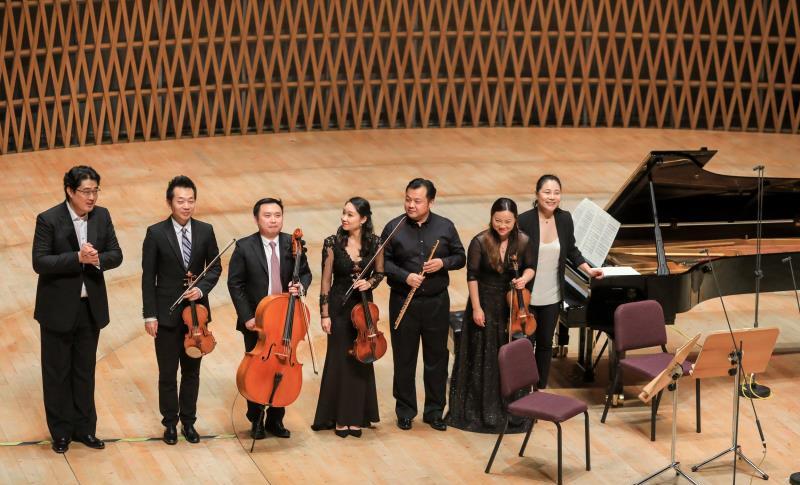
This year coincides with the 250th anniversary of Beethoven's birth, and due to the impact of the epidemic, many commemorative concerts have been cancelled. On the stage of the Shanghai Summer Music Festival (MISA), on the evening of July 23, Shen Yang, a bass baritone, joined hands with Hu Zhe, principal flute of the Shanghai Symphony Orchestra, and the East Coast Quartet (Huang Na, the first violin, Shi Zhenyu, the viola Batong, and Chen Shaojun on the cello), bringing the "Beethoven in the Distance" concert - the repertoire is rare beethoven works performed on the world stage, such as flute and piano variations "The Last Rose of Summer", "Scottish Folk Song" and so on.
"The Shanghai stage is willing to accept these unpopular works, Shanghai music fans have the standard to appreciate these unknown classics, thank you MISA for letting me sing these melodies in the works of famous artists!" Shen Yang sighed heartily.
Beethoven's first six string quartets (Op.18) are generally considered to be works that mark the true maturity of his work. Of the six, the fourth concert (this is the order of publication, not Beethoven's) is special because its manuscripts have not been found. Beethoven never discarded his drafts and notes, so many musicologists suspect that the work was actually composed earlier—before Beethoven came to Vienna, or at least used much of the material from the Bonn period. It must be admitted that there are indeed some inexplications and bluntness in the music, which are less performed in the Beethoven Quartet. However, because of this jerkiness, fans can better understand the development process of Beethoven's musical style.
Compared to this quartet, the other tracks on this concert are even less known. Beethoven's "Hidden Corners" also includes a large number of his adaptations of Scottish and Irish folk songs, often composed of a baritone, a piano, plus a violin and cello, adapting these folk songs.
The reason why Beethoven began to adapt these ballads dates back to 1809. At that time, Beethoven lived in Vienna for more than a decade, writing the Symphony of Heroes, the Symphony of Destiny and the opera Federio, which according to Roman Rowland was Beethoven's "heroic period". But it was precisely during this so-called "heroic period" that Beethoven began to orchestrate these humble gadgets – European folk songs.
It can be seen that a single label does not reflect the whole picture of a genius's creation. Beethoven's folk song adaptations were commissioned by music publisher George Thomson. At first, Le Sheng doubted whether he could do it, but after trying to compose a few songs, he could not receive it, and in the 11 years from 1809 to 1820, he adapted a total of 179 folk songs for Thomson, mainly Irish, Scottish and other folk songs, and later supplemented a number of folk songs from all over the Continent. To this end, Beethoven even pushed back other commissions, which shows that he is extremely interested in this work (it is worth mentioning that Thomson paid him very generously).
George Thomson was an avid folk song collector who began to carry out the folk song adaptation and publication program in the 1780s, and invited well-known European composers Haydn, Beethoven, Hummel, Weber and others to work for this project. The views of the collectors of folk songs in the 19th century were different from those of today. Today's emphasis is on authenticity, and in the 19th century, folk songs were often heavily adapted for use in salons or chamber concerts.
Thomson once compared Beethoven's adaptation of these folk songs to Shakespeare's plays, Shakespeare's theatrical themes were actually written by many predecessors, but only in Shakespeare's pen did they show immortal brilliance; and Beethoven's talent shone on these simple folk songs, which also made them classics worthy of repeated appreciation. This is the stage of MISA, willing to use an open and inclusive mind to show the audience these unpopular classics that should be listened to but not heard.
Photo: Ye Chenliang
Edit: Jiang Fang